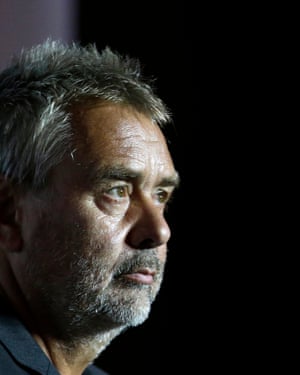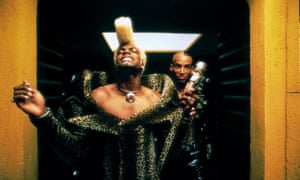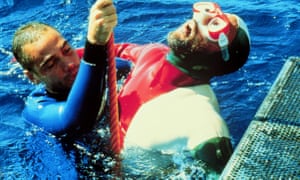Luc Besson on turning Rihanna into a 28th-century Cleopatra and being stood up by Prince | Film
No one needs a hit right now more than Luc Besson. His production company, EuropaCorp, recently posted record losses of $135m. He was ordered last year to pay nearly half a million dollars after being found guilty of plagiarising John Carpenter’s Escape from New York in his 2012 screenplay Lockout. And his new futuristic adventure, Valerian and the City of a Thousand Planets, is the most expensive independent movie ever made, with a budget of around $200m. The film needs to crack at least $400m worldwide (like his Scarlett Johansson action fantasy Lucy) to push the company back into the black. Right now, that looks as far fetched as any of the film’s 28th-century intergalactic escapades. Valerian had a dismal $17m opening weekend in the US last month. In Germany, it landed in third place behind Despicable Me 3, which had already been on release for three weeks.

There are glimmers of hope. France welcomed the movie enthusiastically last week, as it usually does with anything by the Parisian film-maker, giving it the second-best opening day of the year. But these are still fraught times for Besson. “It’s difficult launching a film like this,†the embattled 58-year-old director says when we meet in a London hotel. “The big studios don’t leave you any room. They love to take all the space.†He is a stocky bear of a man but today he looks small and sheepish with unkempt hair, a more-salt-than-pepper beard and a T-shirt bearing the title of the movie on which his reputation rests.
Besson had tried to get Valerian made for seven years. “It’s my baby. Probably my most important one.†He gives a soft heh-heh. “It’s kind of crazy.†Adapted from the comic strip Valérian and Laureline, the film presents a jubilant, noisy, gaily-coloured alien world. Flirting and bickering their way through it are a pair of young law enforcers, played by Dane DeHaan and Cara Delevingne, investigating an attack on a peaceful planet. The movie opens with a warmly funny montage of interspecies etiquette, as scientists and astronauts encounter various alarming extraterrestrial counterparts throughout the centuries.
“That’s the stuff that makes it real. I wanted to imagine the future positively. Today people look around them and say, ‘Oh she’s black’ or ‘he’s homosexual’ or this one is too old, this one too young. There’s always some barrier to make others difficult to be with. Imagine now that we have to deal with 8,000 different species coming from space. Suddenly anyone terrestrial will look like my brother. So the film is my way of saying, ‘Are you sure it’s so difficult to live together? Really? How comfortable will you feel when you have to deal with these guys?’â€
Besson’s equally out-there 1997 adventure The Fifth Element was progressive in its view of race and gender, placing in the traditional damsel-in-distress role a priapic African-American man (Chris Tucker). The new film goes further, enabling several characters to personify male and female simultaneously. “Society is structured around the differences between men and women, but if you have too much difference, there is trouble. I think the artistic part is more feminine. I have the feeling that I have been using that side of myself since I was 10.†That was the age he got hooked on Valérian and Laureline. “It was the first time I had ever seen a couple where the woman was so in charge. That was a big influence.†He grins. “Look at me. I am like the guy who cuts down trees in Canada.†A lumberjack? “Yes! I’m the lumberjack. But inside I have the sensitivity of a woman.â€

This claim is hard to reconcile with the man who bashes out coarse action thrillers beginning with T: Taxi, Taken and Transporter can all be attributed to, or blamed on, him. That’s Besson in hack mode, as a one-man script factory, whereas the films he chooses to direct (such as the hippy-dippy diving drama The Big Blue and the hitman buddy movie Léon) tend to be more nuanced. There is certainly tenderness in Valerian, which is dedicated to the director’s father, who died last year. It was Besson père who first introduced him to the Valérian and Laureline comics. “I don’t think he ever offered me a novel in his whole life,†he laughs. “But he bought me so many comic books.†Another absent figure looming large over the movie is David Bowie, whose song Space Oddity rings out during the opening sequence. “I was trying to find a good moment to call him to show him how the song fitted into the film but he died before I got a chance.â€< /p>
They last met when Bowie provided one of the voices for Besson’s animated adventure Arthur and the Invisibles. Indeed, the director has a penchant for directing musical performers, including Rihanna and Herbie Hancock in Valerian and Madonna, Lou Reed, Iggy Pop and Snoop Dogg in Arthur and its two sequels. The Fifth Element also featured a cameo by Tricky and very nearly starred Prince in the Chris Tucker role.
“Ah, Prince,†sighs Besson, ruefully. “I love him but it was impossible. He said yes to the part. You make a meeting for Monday at noon and he turns up on Tuesday at six. Or he cancels three times. Always so charming and sweet but the reality of musicians doesn’t fit with film. I warned him a few times and he said, ‘But this is my tempo.’ Finally, I asked him: ‘Do you mind if we just do something less big another time?’†Working with Rihanna, who plays the shape-shifting dancer Bubble in Valerian, was more straightforward . He took particular pride in getting her to deliver lines from Anthony and Cleopatra. “For me that’s the ultimate pleasure â€" Rihanna, the queen of music, as Cleopatra. It’s the sort of mix I love. We can all listen to reggae music in Greenland while eating sushi. We are allowed to do whatever we like!â€
If this is Besson thumbing his nose at critics who accuse him of being lowbrow, then it won’t be the first time. In his 2013 black comedy The Family, Michelle Pfeiffer blows up a shop in rural France because the owner is heard disparaging America. “I am Michelle in that scene,†he says. “I’ve heard so many French people saying, ‘Oh, the Americans don’t have culture.’ I want to say, ‘When is the last time you went to the Louvre? Shut up!’â€

His career can partly be explained as a populist lashing out against the cinephile country of his birth but it is also the revenge of the nerd. Besson’s parents divorced when he was a child and dumped him in a boarding school while they started families with their new partners. When he realised he wanted to make films, he was mocked by his friends. “They said: ‘Oh, you’re gonna work with Alain Delon, are you?’†He felt completely alone. “You’re by yourself. You’re too weird for girls. The two subjects I could talk about were dolphins and movies. The girls actually ran away when they saw me.â€
Out of these feelings of isolation came his witty 1983 debut, The Last Battle, set in a post-apocalyptic wasteland populated by mute, scavenging survivors. The first scene shows the hero having sex with an inflatable doll, a moment I had always taken to be a screw-you to the establishment which had denied Besson entry to film school because his influences (Spielberg, Scorsese, MiloÅ¡ Forman) were too mainstream. But he corrects me. The message of that scene was exactly the same as Valerian’s: look after what you’ve got before you lose it. “It was a way of saying to people: Be careful. If you destroy everything, this is what you’ll be left with. Earth will be dying and you will be all alone, fucking a plastic Barbie.â€
Perhaps that message extends also to Besson’s own future. A bruising for Valerian would still knock the stuffing out of EuropaCorp. But that’s unlikely to hamper someone as passionate and eccentric as Besson: he has been making films for too long now to start playing it safe. “My dreams are my dreams,†he says proudly. “I wanted to do Valerian for the longest time. I wondered, ‘Can I do it?’ But once I get started, I’m like the English foxhound: I will never let go.â€

0 Response to "Luc Besson on turning Rihanna into a 28th-century Cleopatra and being stood up by Prince | Film"
Posting Komentar